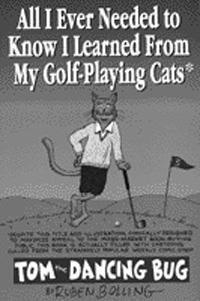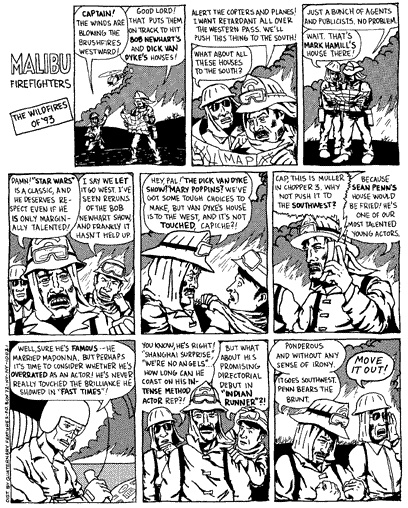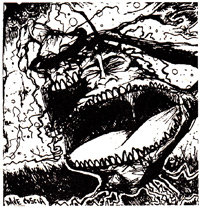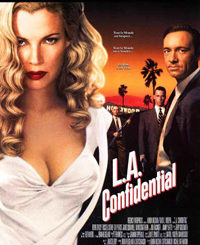 Tom the Dancing Bug
Tom the Dancing Bug
An interview with creator Ruben Bolling
by William Ham
Ruben Bolling is a New York resident (and former Somerville homeboy) who just happens to write and draw the funniest, sharpest comic strip since the heyday of Life In Hell. Swatches of the satirical crazy quilt that is Tom the Dancing Bug have now been compiled in a book,All I Ever Needed to Know I Learned From My Golf-Playing Cats (NBM). Read this interview, buy the book, and petition your local rag to start carrying it toot sweet, or there might be trouble.
What inspired you to start your own comic strip?
It’s something I’ve wanted to do since I was a fetus, but I never thought I’d be able to do it on any kind of professional level. At a certain point in my life I realized, “Hey, I can pull this off!” I was influenced by things like Bloom County and Doonesbury and I tried to do a comic strip that was like that, you know, the kind with a pause panel and a little wry punchline. And I was doing some pretty mediocre stuff until I started doing not so much what I thought a comic strip had to be, but had the kind of humor that I had when I was hanging out with my friends. That was when I really turned the corner.
And then you managed to get yourself syndicated. How long has that been going on?“Syndicated” is kind of a loaded term. I considered myself syndicated in about ’91, which was when I began appearing in more than one paper. Since then, I’ve built it up to about 50 papers, then just a couple of weeks ago, I signed up with a major syndicate, Universal. I was real surprised that they were interested. Other syndicates have approached me in the past because when you build it up to a certain level, they start rubbing their hands and licking their chops getting ready to sink their teeth into it. I’d tell them what I do and how I do it and they’d always say “whenever you want to make a three-panel Beetle Bailey-type strip, let us know.”
 And look what happened to that strip recently.I know, and that’s exactly what I didn’t want, ’cause I’m sure the Beetle Bailey thing came about because of pressure from the syndicate. If I wanted to make tasteless sexist jokes about secretaries, I wanna be free to do it. With Universal, I’m doing the exact same thing, I’m just sending it to one place instead of fifty. I don’t know how they’re gonna expand the strip. It’s very quirky, it’s not going to be in every daily paper, it’s never gonna be Calvin and Hobbes, but I just wanted to get out of the business side of it and concentrate on the cartooning. But I’ve taken a lot of heat for it.
And look what happened to that strip recently.I know, and that’s exactly what I didn’t want, ’cause I’m sure the Beetle Bailey thing came about because of pressure from the syndicate. If I wanted to make tasteless sexist jokes about secretaries, I wanna be free to do it. With Universal, I’m doing the exact same thing, I’m just sending it to one place instead of fifty. I don’t know how they’re gonna expand the strip. It’s very quirky, it’s not going to be in every daily paper, it’s never gonna be Calvin and Hobbes, but I just wanted to get out of the business side of it and concentrate on the cartooning. But I’ve taken a lot of heat for it.
So comics is basically punk rock with ink on its fingers. Do you find the creative aspect difficult sometimes when it’s expected of you on a regular basis? Is that a problem?
It’s a tremendous problem. I have cartoonist friends who can just churn stuff out, and I don’t know if that’s better or not, but I’m just constantly up against the wall and never think of anything until the deadline’s there and I absolutely have to think of something. Then something clicks in. It’s a constant panic – I do four comics every four weeks, and every time I send in those four comics, I secretly feel like I’m fooling everybody and all my clients are going to realize that I’m done. The sponge is dry. That’s the last four I’ll ever be able to squeeze out of there. And then it happens again next month.
Sounds familiar. I’m looking here at the Bill Gates “Kerouac” piece, which I think is brilliant… how long does it take to come up with something like that?
It doesn’t come easily. Some of the stuff takes a long time to come up with, then once I think of the idea, the whole thing just flows and I’m really just transcribing, writing as fast as I can to write the whole nine-panel thing that just came to me all at once. Other times, I just labor over every single panel and the order of panels and how everything should go and which word goes where. That Bill Gates one is probably an example of one that I really labored over because I’m not really familiar with that genre of writing, and so I had to work out exactly what I wanted to say. The ones that sort of write themselves are probably the best-written ones, they just flow. The one that comes to mind – I remember it was deadline day and this news event happened and I wrote it all between dinner time and six in the morning. That was the “Malibu Firefighters” one. Even the drawing, which is a bit of a step up for me, just flowed out. I was really in a trance. It’s most fun that way and that’s when it’s the best. But you can’t control that, so you just hope it happens to you often enough.
What makes you laugh?
I don’t find many comics funny, especially newspaper comics. It wasn’t long ago that there was a sort of golden age of comics, but when Bloom County and Calvin and Hobbes and The Far Side retired, that whole format really suffered ’cause there’s not much quality out there. Things like Beetle Bailey are about as funny as a root canal. I think the funniest stuff that’s being done now is on television and a little bit in the movies. Kids in the Hall is quite brilliant. Good writing, too, like Mark Leyner, who’s sort of in the same vein, he pretends to be a novelist but what I think he’s doing is just writing sketches in prose.
Any ambitions of pulling a Groening and crossing over into other media?
Not ambitions so much but I have given thought to it. I just haven’t pursued it on any kind of proactive level. I’m just trying to tread water and get a comic strip out there every week. But television in particular, that’s the type of comedy that influenced me – the old SNL, for example – and I find that in comics, I’m doing the same thing as if I were writing for TV, coming up with premises and that sort of thing. It’s strange to be doing it in this way – it’s like my first language is Czech but I’m writing in English. The great thing about doing what I do is that anyone could do it – if you have a pen, you do can do a comic and if you have a typewriter you can write a novel. They’re great, vibrant art forms. It’s sort of distressing to see a lot of our most creative people drawn to movies – it’s a shame that something so dependent on capital and collaboration has become our major national art form. At least you have the option with comics to do whatever you want – if you have 89 cents you can do it.
What is your message for the youth of America?
Follow your dreams, Trix are for kids, and buy my book.



